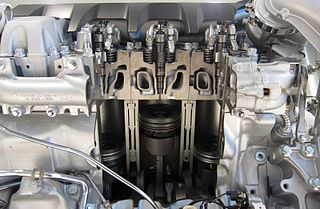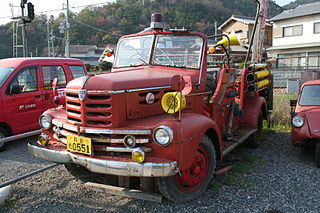
The automotive industry comprises a wide range of companies and organizations involved in the design, development, manufacturing, marketing, selling, repairing, and modification of motor vehicles. It is one of the world's largest industries by revenue.

Robert Bosch GmbH, commonly known as Bosch, is a German multinational engineering and technology company headquartered in Gerlingen, Germany. The company was founded by Robert Bosch in Stuttgart in 1886. Bosch is 94% owned by the Robert Bosch Stiftung, a charitable institution. Although the charity is funded by owning the vast majority of shares, it has no voting rights and is involved in health and social causes unrelated to Bosch's business.

Isuzu Motors Ltd., commonly known as Isuzu, is a Japanese multinational automobile manufacturer headquartered in Yokohama, Kanagawa Prefecture. Its principal activity is the production, marketing and sale of Isuzu commercial vehicles and diesel engines.

Common rail direct fuel injection is a direct fuel injection system built around a high-pressure fuel rail feeding solenoid valves, as opposed to a low-pressure fuel pump feeding unit injectors. High-pressure injection delivers power and fuel consumption benefits over earlier lower pressure fuel injection, by injecting fuel as a larger number of smaller droplets, giving a much higher ratio of surface area to volume. This provides improved vaporization from the surface of the fuel droplets, and so more efficient combining of atmospheric oxygen with vaporized fuel delivering more complete combustion.
Lucas Industries plc was a Birmingham-based British manufacturer of motor industry and aerospace industry components. Once prominent, it was listed on the London Stock Exchange and was formerly a constituent of the FTSE 100 Index. In August 1996, Lucas merged with the American Varity Corporation to form LucasVarity.
Nissan Group, or formerly Nissan zaibatsu, is a group of companies and Japan's most powerful business groupings.

UD Trucks Corporation is a Japanese company whose principal business is the manufacturing and sales of diesel trucks, buses, bus chassis and special-purpose vehicles. Its headquarters are located in Ageo, Saitama, Japan. The company is a wholly owned subsidiary of Isuzu since 2021. Until 2010, the company was known as Nissan Diesel.

The PACE Award is an annual award from Automotive News. The focus of the award is an innovation (i) developed primarily by a supplier, (ii) that is new to the automotive industry, (iii) that is in use, and (iv) that "changes the rules of the game". Awards have been given for products, materials, processes, capital equipment, software and services. A panel of independent judges from industry, finance, research, and academia choose finalists from the initial applicants, make site visits to evaluate the innovation, and then gather to select winners, independent of the sponsors. Winners to date include suppliers from Japan, Korea, China, the US, Canada, Brazil, Germany, France, Italy, Poland and other European countries. Among the most awarded companies over the years are BorgWarner, Delphi Automotive, Federal-Mogul, Valeo and PPG Industries as well as Robert Bosch GmbH, Gentex Corporation, and Siemens.

The Isuzu Bellel is a compact car produced by the Japanese automobile manufacturer Isuzu from 1961 to 1967. It was the company's first independent design, and also Japan's first passenger car with a diesel engine. It was available as a four-door sedan and a five-door station wagon, called the Bellel Express. The Bellel Express was technically speaking a commercial vehicle, as was the custom in Japan at the time. The name "Bellel" resulted from combining the English word "bell" with the Roman numeral "L", equalling 50, and thus the name was supposed to represent "fifty Bells", and reflects a tradition within Isuzu of naming products that use terms that have special significance in Japan. Production began in time for the 1964 Summer Olympics held in Tokyo in October 1964, with initial release in select Japanese cities starting in April 1962.

The Isuzu 117 Coupé is a compact Gran Turismo type 2-door fastback coupé which was produced by the Japanese automobile manufacturer Isuzu between 1968 and 1981. 117 was the codename for a common development program of Isuzu mid-size cars, involving a coupé, sedan, and station wagon. The latter two eventually became the Isuzu Florian, but the coupé kept the original name. The two ranges shared mechanicals, including the complete FR layout chassis with recirculating ball steering.

The Isuzu Elf is a medium duty truck produced by Isuzu since 1959. Outside Japan it is known as N series and Q Series. The range was originally mainly available in Japan and other Asian countries. Australia was another important market for the Elf and N series – to the extent that it was manufactured there from the 1970s using many local components. Since the early 1980s, it has also been sold and built in the United States, and also as the Isuzu N-Series. Only North America receives the wide-cab version.
JECS Corporation (formerly Japan Electrical Control Systems Co Ltd) is an automotive components company headquartered in Isesaki, Gunma, Japan and a wholly owned subsidiary of Hitachi. Its principal products are electronic control units, software, semiconductors, mechatronics, resin molding, inspection technology and material analysis.

Koyo Seiko was established as a private company by Zenichiro Ikeda in 1921. They initially sold imported bearings but by 1935 had begun production of Koyo branded bearings under the name Koyo Seiko Co., Ltd.
The Nissan ZD30 engine family is a 3.0-litre inline-four cylinder diesel engine with a bore and stroke of 96 mm × 102 mm, that replaced the Nissan QD, BD and TD engines. At Renault it also replaced the Sofim 8140 engine and is the only truck diesel engine which remained with Nissan Motors when they sold Nissan Diesel to Volvo trucks in 2007.

A unit injector (UI) is a high-pressure integrated direct fuel injection system for diesel engines, combining the injector nozzle and the injection pump in a single component. The plunger pump used is usually driven by a shared camshaft. In a unit injector, the device is usually lubricated and cooled by the fuel itself.

The automotive industry in Pakistan is one of the smallest but fastest-growing industries in the country, growing by 171% between 2014 and 2018. It accounts for 3% of Pakistan's GDP and employed a workforce of over 3.5 million people as of 2018. Pakistan is the 23rd largest producer of automobiles. Its contribution to the national exchequer is nearly Rs. 50-billion. Pakistan's auto market is among the smallest but fastest growing in Asia. 269,792 cars were sold in 2018, but this number declined to 186,716 in 2019 due to austerity measures. In the 1990s and early 2000s, Pakistan had many Japanese cars. With the launch of the first Auto Policy in 2005, Pakistan launched its first indigenous car, Adam Revo. However, after the 2008 elections, the dollar started depreciating, and due to bad governance, many automakers began to halt production, with some exiting Pakistan. Currently, the auto market is dominated by Honda, Toyota, and Suzuki. However, on 19 March 2016, Pakistan passed a second "Auto Policy 2016-21," which offers tax incentives to new automakers to establish manufacturing plants in the country. In response, Renault, Nissan, Proton Holdings, Kia, SsangYong, Volkswagen, FAW, and Hyundai have expressed interest in entering the Pakistani market. MG JW Automobile Pakistan has signed a memorandum of understanding (MoU) with Morris Garages (MG) Motor UK Limited, owned by SAIC Motor, to bring electric vehicles to Pakistan. NLC signed an agreement with Mercedes-Benz to manufacture Mercedes Actros trucks in Pakistan. Pakistan has not enforced any automotive safety standards or model upgrade policies. A few older vehicle models, including the Bolan and Ravi, continue to be sold by Suzuki. On 8 July 2021, Jolta Electric launched the production of electric motorcycles.

Subaru is the automobile manufacturing division of Japanese transportation conglomerate Subaru Corporation, the twenty-first largest automaker by production worldwide in 2017.

The automotive industry in Japan is one of the most prominent and largest industries in the world. Japan has been in the top three of the countries with the most cars manufactured since the 1960s, surpassing Germany. The automotive industry in Japan rapidly increased from the 1970s to the 1990s and in the 1980s and 1990s, overtook the U.S. as the production leader with up to 13 million cars per year manufactured and significant exports. After massive ramp-up by China in the 2000s and fluctuating U.S. output, Japan is currently the third largest automotive producer in the world with an annual production of 9.9 million automobiles in 2012. Japanese investments helped grow the auto industry in many countries throughout the last few decades.
Stanadyne LLC is a developer and manufacturer of fuel pumps and fuel injectors for diesel and gasoline engines. The company is based in Windsor, Connecticut, with global locations in Changshu, China, Chennai, India, Brescia, Italy and Sharjah, UAE. The company also operates a manufacturing facility in Jacksonville, NC. The company specializes in fuel injection equipment producing components for gasoline direct injection engines, Common rail systems, electronic and mechanical governed rotary distributor pumps for diesel engines and diesel fuel injectors. Stanadyne is wholly owned by the private equity firm Kohlberg & Company.

The Isuzu TX series truck was built from 1934 until the end of World War 2, then resumed production starting in 1946 until 1979 and was powered by a diesel engine. It was the company's first successful heavy duty truck used in various roles to include firetruck, tank truck, construction, dump truck, and cargo transport. It shared a chassis with the BX series bus, and evolved from the Isuzu Sumida bus that was produced starting in 1929. The TX series had several models based on engine size and payload requirements.














